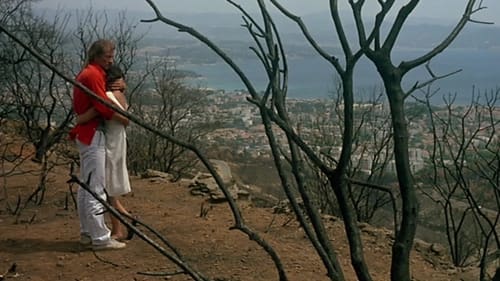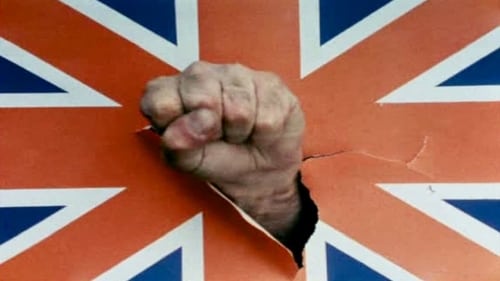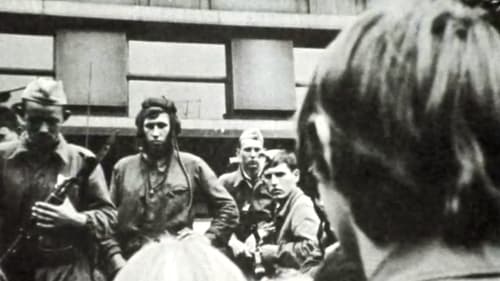
Cow-boy
Melé canta en un bar, su marido Chaka está en el paro y la pareja está a punto de romper. El patio de la casa que comparten con otras familias se ha convertido en una sala de juicios: portavoces de la sociedad civil africana acusan al Banco Mundial y al Fondo Monetario Internacional de los males que afligen a África. Y mientras se suceden las declaraciones de acusadores, defensores y testigos, la vida en el patio continúa. Chaka no parece muy preocupado por este deseo insólito de África de luchar por sus derechos. (FILMAFFINITY)

Director
Anne Buridan is about thirty years old and likes challenges. Her last challenge is to make a movie on May 68. It's a challenge, not only because she will be forced to face a story that is not hers, but specially because her new boyfriend, Blaise, doesn't understand this idea, even more, he hates people that have participated at this event. Anne Buridan is a methodical person and even a bit obsessive. Nothing and nobody will make her turn away from her project. She starts to meet people that were figures of that period. She will start, evidently, with a woman, Marianne, who speaks amongst others, of Jean-Pierre Lucciani. The name is not unknown to her because it's the same as Blaise's. She will go see him right away. Jean-Pierre is Blaise's father alright. She goes back home and keeps the secret from Blaise. Anne Buridan just lost, without knowing it, control over this situation.

Director
Jean-Henri Roger's Lulu stars Elli Medeiros as the title character. Lulu is a transsexual who lives with John (Gerard Meylan). One of the town drunks she serves at her bar accuses her of killing a local criminal. A detective (Bruno Putzulu) starts a quirky investigation into the charge. A journalist (Jean-Pierre Kalfon) with affectionate feelings for Lulu figures in the plot. Lulu was shot on Digital Video.

Director
"Clara, screenplay and dialogues of a Franco-Czechoslovak film, the co-director should have been the Czech filmmaker Kadar. Screenplay adaptated in 1989 by Philippe Garrel and students of the University of Paris X (Nanterre). The subject of the film - which is also a love story - is part of the political atmosphere, release the XXth Congress of the Soviet Communist Party has changed both individual for a certain way of seeing and understanding History: political trials, purges in Czechoslovakia, Hungary events of 1956, Algeria war, cold war." - KG

Writer
Directors Jean-Henri Roger and Juliet Berto begin this thriller with sequences on the contemporary politics of southern France and the infiltration of organised crime into real estate development there: crime bosses were torching forest tracts to make way for their development schemes in the early 1980s. In the fictionalised story, Paula Barretto is caught in this underworld because her father was involved in the drug business, her brother is in the real estate scam, and her lover is an armed thief. Although she tries to get out of her corrupt and dangerous environment, it is not an easy task when even the police officers cannot be trusted, and the underworld has informants everywhere.

Director
Directors Jean-Henri Roger and Juliet Berto begin this thriller with sequences on the contemporary politics of southern France and the infiltration of organised crime into real estate development there: crime bosses were torching forest tracts to make way for their development schemes in the early 1980s. In the fictionalised story, Paula Barretto is caught in this underworld because her father was involved in the drug business, her brother is in the real estate scam, and her lover is an armed thief. Although she tries to get out of her corrupt and dangerous environment, it is not an easy task when even the police officers cannot be trusted, and the underworld has informants everywhere.

Director
This drama about a barmaid caught up in events beyond her control is the first film directed by Juliet Berto, and was also based on her own concept for the story. The barmaid, played by Berto, has been trying to take care of Bobby, a teenage drug pusher who is in over his head. Before she can put him back on track and get him out of the drug underworld, the young man is killed while being chased by a narcotics agent. Depressed by his death but not derailed, she finds herself trying to help out a gay user who depended on Bobby for his supply of drugs. She decides to procure some drugs for the desperate addict, and is trapped in the bathroom of a bar - with the drugs - when narcotics agents burst upon the scene. Her boyfriend rushes to help her but is killed by an agent who shoots first and thinks later. The barmaid does not face a very optimistic future as the narc arrests her - but releases a parish minister who had been helping her find a source for the drugs.

Director of Photography
Two sisters, Camille and Madeleine, make up the story of a woman: Alice Constant, the servant of their grandfather who committed suicide at the age of 25.

Director
Jean-Luc Godard brings his firebrand political cinema to the UK, exploring the revolutionary signals in late '60s British society. Constructed as a montage of various disconnected political acts (in line with Godard's then appropriation of Soviet director Dziga Vertov's agitprop techniques), it combines a diverse range of footage, from students discussing The Beatles to the production line at the MG factory in Oxfordshire, burnished with onscreen political sloganeering.

Writer
Jean-Luc Godard brings his firebrand political cinema to the UK, exploring the revolutionary signals in late '60s British society. Constructed as a montage of various disconnected political acts (in line with Godard's then appropriation of Soviet director Dziga Vertov's agitprop techniques), it combines a diverse range of footage, from students discussing The Beatles to the production line at the MG factory in Oxfordshire, burnished with onscreen political sloganeering.

Editor
Filmed clandestinely in Czechoslovakia on 16mm. It's one of the films Godard made with the Groupe Dziga Vertov - a Marxist film about the political situation after the '68 revolution.

Writer
Filmed clandestinely in Czechoslovakia on 16mm. It's one of the films Godard made with the Groupe Dziga Vertov - a Marxist film about the political situation after the '68 revolution.

Director
Filmed clandestinely in Czechoslovakia on 16mm. It's one of the films Godard made with the Groupe Dziga Vertov - a Marxist film about the political situation after the '68 revolution.











